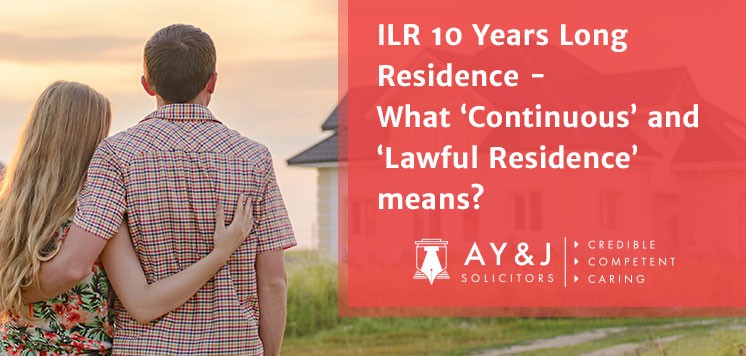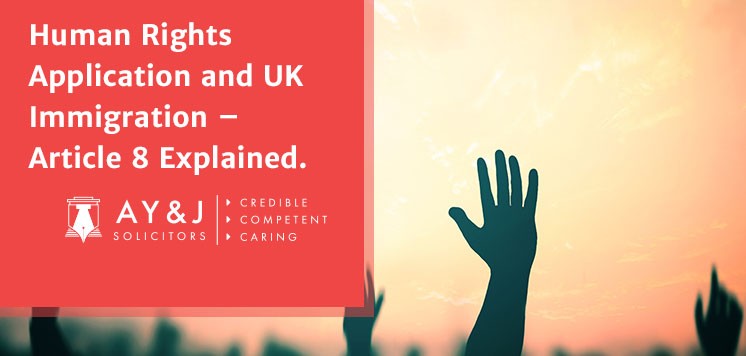ILR 10 Years Long Residency Route benefits those migrants who have spent a decade and integrated their life in the UK. Under paragraph 276B of the Immigration Rules, a person who has been in the UK lawfully for 10 or more years can apply for Indefinite Leave to Remain. The route is paved with challenges, and few applicants qualify to apply. Therefore, if you are considering making an application, seeking quality legal advice is recommended.
Client Says, “A Y & J managed my ILR (10 Years) application and I am extremely happy with the professional approach and the level of service received.
A Y & J managed my ILR (10 Years) application and I am extremely happy with the professional approach and the level of service received.
There was a technical Abstruseness with the application but they pointed it out efficiently. Special thanks for being extremely supportive during the entire application process and making sure that the application submitted had a good presentation.
I would definitely use A Y & J Solicitors again for any future immigration needs and highly recommend them for professional and reliable immigration service”.
What are the Eligibility Requirements for ILR 10-years’ Long residence?
To be eligible for ILR after ten years’ long residence you must meet the following requirements:
- You must have at least ten years of continuous lawful residence in the UK.
- Granting you ILR should not be detrimental to the public good.
- You must meet the knowledge of language requirement and pass the Life in the UK test.
- Any general grounds for refusal for ILR should not apply to your application for example tax deception charges.
- You must not be in breach of immigration laws, except.
1. For any period of overstaying for 28 days or less which will be disregarded where the period of overstaying ended before 24 November 2016.
2. Where overstaying on or after 24 November 2016, leave was never the less granted in accordance with paragraph 39E of the Immigration Rules.
What is ‘Continuous Residence’
A continuous lawful residence is defined in paragraph 276A(a) of the Immigration Rules which states:
“(a) “continuous residence” means residence in the United Kingdom for an unbroken period, and for these purposes a period shall not be considered to have been broken where an applicant is absent from the United Kingdom for a period of 6 months or less at any one time, provided that the applicant in question has existing limited leave to enter or remain upon their departure and return, but shall be considered to have been broken if the applicant:
- Has been removed under Schedule 2 of the 1971 Act, section 10 of the 1999 Act, has been deported or has left the United Kingdom having been refused to leave to enter or remain here; or
- has left the United Kingdom and, on doing so, evidenced a clear intention not to return; or
- left the United Kingdom in circumstances in which he could have had no reasonable expectation at the time of leaving that he would lawfully be able to return; or
- has been convicted of an offence and was sentenced to a period of imprisonment or was directed to be detained in an institution other than a prison (including, in particular, a hospital or an institution for young offenders), provided that the sentence in question was not a suspended sentence; or
- has spent a total of more than 18 months absent from the United Kingdom during the period in question”.
In a nutshell, you can have spent time out of the country so long as you:
1. Have to leave to enter or remain when you leave the country.
2. Do not stay out of the UK for longer than six months.
3. Have to leave to enter or remain when you come back to Britain.
If you have had a break in continuous residence, the clock effectively restarts from the date you return.
Where applicants get into trouble is under section v. Over 10 years, 18 months or 540 days absence is not a lot of time. There are many reasons a person may have been outside the UK for this period of time. For example, they may have attended boarding school as a child and gone home during the school holidays. Or they may have had an ill relative at some point during their time in the UK, which required them to spend periods of time outside the country looking after them.
Immigration policy states that where there have been absences of more than 540 days;
“It may be appropriate to exercise discretion over excess absences in compelling or compassionate circumstances, for example where the applicant was prevented from returning to the UK through unavoidable circumstances”.
Apart from considering the reasons for the absences and whether the applicant returned to the UK as soon as they could, very little guidance is given regarding exercising discretion, which would indicate it is not applied readily or often.
What is Lawful Residence?
You cannot gain ILR under the 10-year rule unless your stay in the UK is continuous and lawful. “Lawful residence” is defined at paragraph 276A(b) as:
“lawful residence” means a residence which is continuous residence pursuant to:
(i) existing leave to enter or remain; or
(ii) temporary admission within section 11 of the 1971 Act where leave to enter or remain is subsequently granted; or
(iii) an exemption from immigration control, including where an exemption ceases to apply if it is immediately followed by a grant of leave to enter or remain.
In theory, any period of unlawful residence, no matter how short, could result in a break in the period of continuous residence. However, the guidance to caseworkers states ILR may be granted where there are periods of overstay as long as the applicant:
“Has short gaps in lawful residence through making previous applications out of time by no more than 28 calendar days where those gaps end before 24 November 2016.
Has short gaps in lawful residence on or after 24 November 2016 but leave was granted in accordance with paragraph 39E of the Immigration Rules meets all the other requirements for lawful residence.”
In addition, if the period of overstay occurred before 24th November 2016, the caseworker has the right to consider any exceptional circumstances.
In summary
Obtaining ILR via the 10-year route requires applicants to meet both continuous residence and lawful residence requirements. However, if these are not met, there are exceptions. And an experienced immigration lawyer can quickly spot these and explain it in legal representation so that the caseworkers can exercise discretion in your favour.
A Y & J Solicitors are specialists in immigration law based in central London. If you would like to have more information, please contact us at [email protected] or call +44 20 7404 7933.
Disclaimer: No material/information provided on this website should be construed as legal advice. Readers should seek an appropriate professional advice for their immigration matters.








